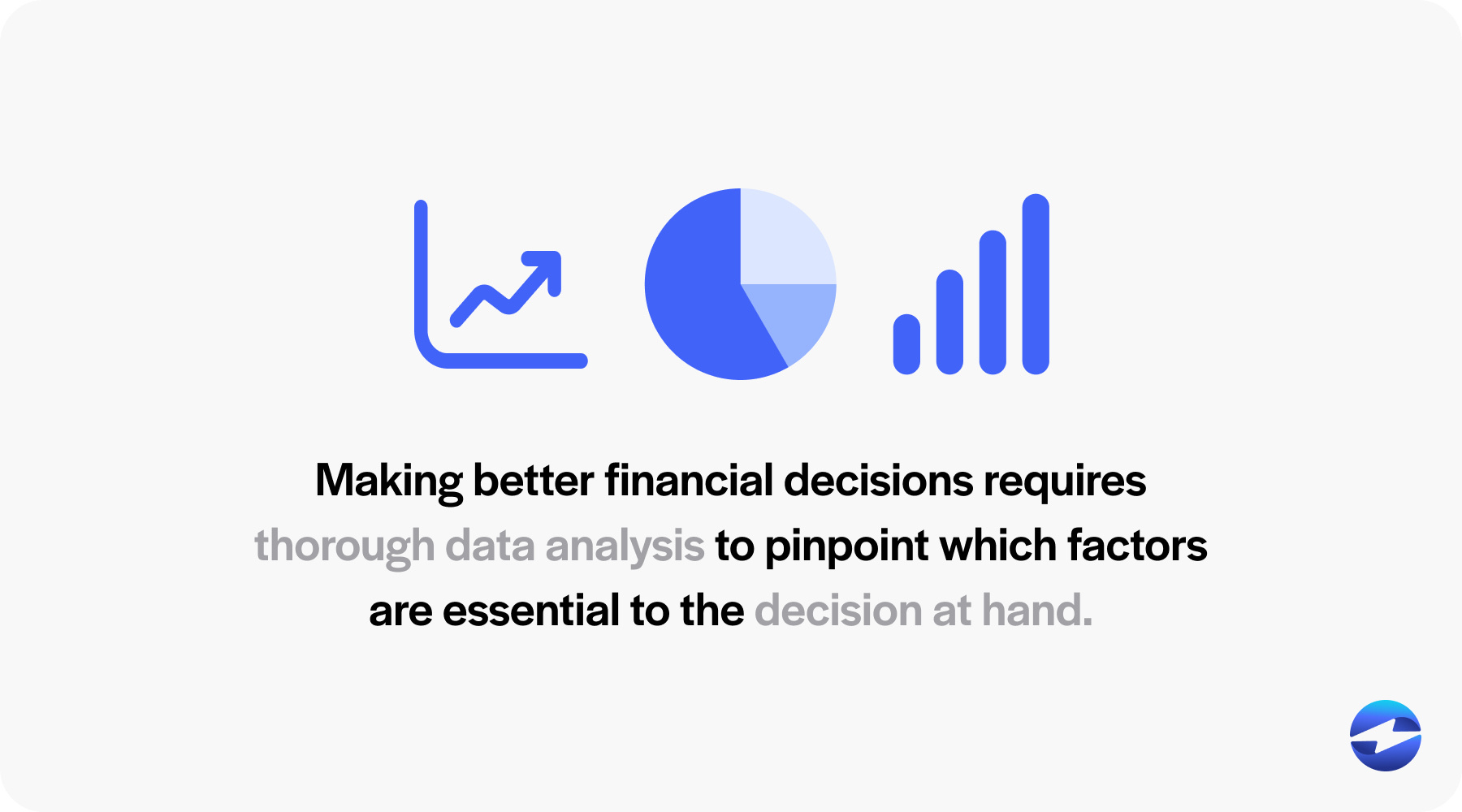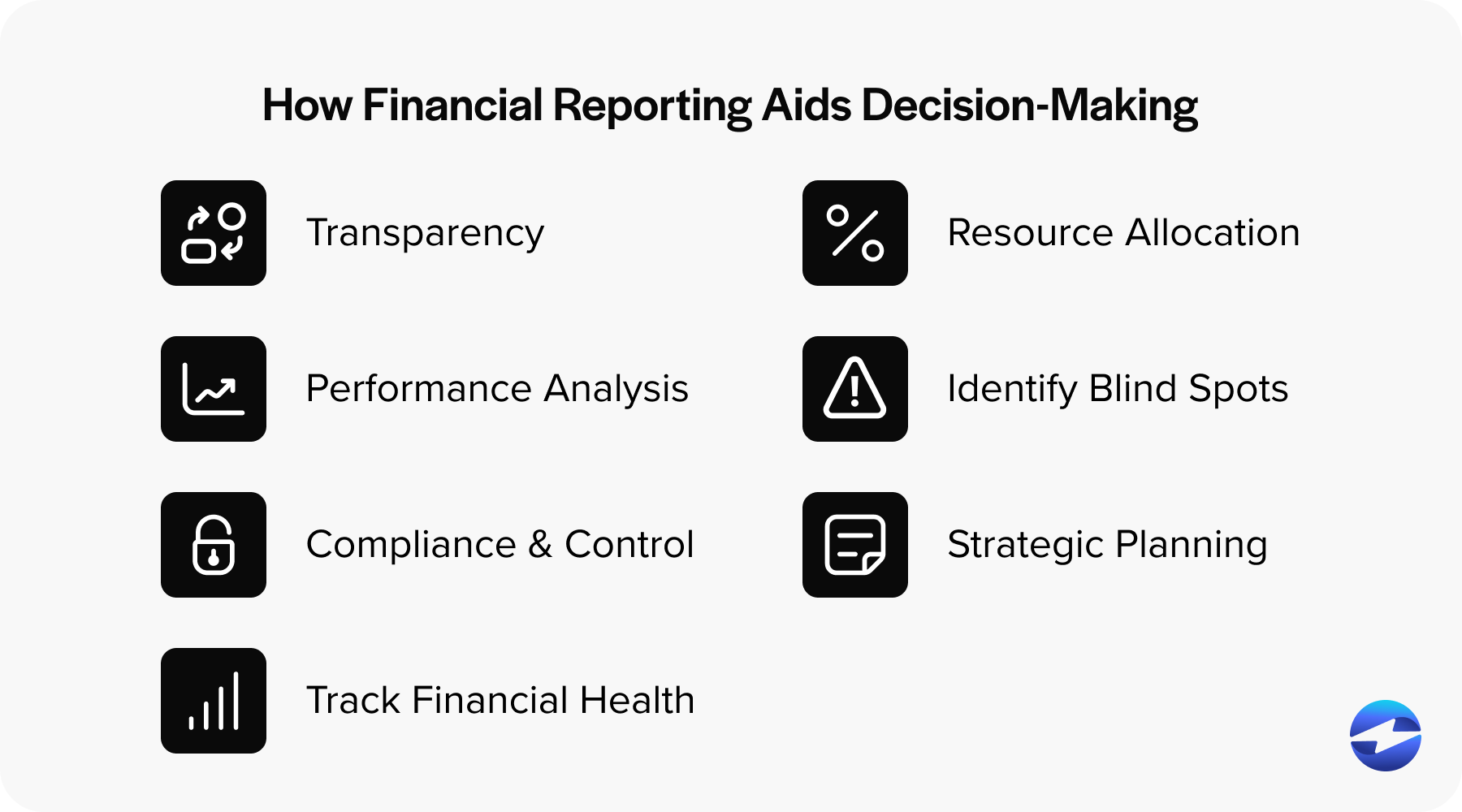Blog > Enhancing Your Financial Decision-Making
Enhancing Your Financial Decision-Making
Whether for retirement planning, managing personal finances, or navigating the complexities of financial statements and balance sheets, making informed choices can significantly impact long-term stability and growth, helping individuals and businesses avoid pitfalls and seize opportunities.
By understanding the principles of sound financial management and employing strategic approaches, one can ensure resources are allocated efficiently, risks are minimized, and goals are achieved.
Understanding financial decision-making
Financial decision-making is a critical process undertaken by individuals, businesses, and finance teams to manage and utilize money in a way that aligns with their decision-making goals and fosters financial health.
This process involves scrutinizing various financial choices and potential outcomes to make informed decisions that can positively impact personal finances, cash flows, and investment decisions, thereby enhancing success.

The financial decision-making process typically includes:
- Setting short-term and long-term goals
- Reviewing financial statements such as balance sheets to understand current economic landscapes
- Analyzing how different initiatives affect financial goals
- Identifying blind spots of various operations and any associated risks
- Evaluating the timing of cash flows and outflows to prevent late payments
By implementing a structured approach to financial management decisions, individuals and organizations can significantly enhance their ability to navigate various situations to work toward a more stable and prosperous economic future.
The importance of strategic financial decision-making
Strategic financial decision-making ensures efficient resource allocation, which is vital for budget management and prioritizing high-impact strategies. This approach minimizes wasteful spending and allows for better negotiation with vendors, reducing costs without compromising quality.
Here are five key reasons strategic financial decision-making is important:

- Maximizes ROI: Sound decision-making maximizes returns on investments (ROI), significantly contributing to a company’s profitability and growth stability.
- Risk Management: Businesses can also proactively assess and manage financial risks associated with marketing campaigns to avoid high-risk investments and ensure financial transparency and accountability, so expenditures align with company objectives.
- Long-term strategies: Effective financial decisions support the development and execution of long-term marketing strategies that align with the company’s overall vision, ensuring scalability and adaptability as the company grows.
- Metrics for success: Financial metrics provide a clear picture of marketing campaign success, fostering continuous improvement and optimization.
- Competitive edge: Investing in innovative technologies and strategies secures a competitive edge and allows for swift adaptation to industry trends.
Additionally, sound financial management boosts employee morale and productivity by providing job security and necessary resources. This is why it’s important to adopt strategies for making the best financial decisions.
3 strategies to enhance financial decisions
Adopting strategies that support good decisions is critical to lasting success in personal or professional finance.

Precise and practical strategies provide a roadmap to navigate various financial circumstances and ever-changing markets. Some of these strategies include setting clear and attainable goals, applying accurate forecasting for better budget management, and risk assessments and mitigation.
Set clear and attainable financial goals
Setting clear and attainable financial goals can provide structure and direction to personal finances and positively impact your decisions and resource allocation.
Achievement-oriented goals act as a motivational tool, steering individuals and businesses toward incremental success. They should be specific, measurable, achievable, relevant, and time-bound.
When goals are clearly defined, the financial decision-making process becomes more purpose-driven, enabling a systematic pursuit of financial health and long-term objectives, such as retirement savings.
Using accurate forecasting to improve budget management
Budgeting requires a forward-looking approach that anticipates future cash flows, expenditures, and revenue streams. Accurate forecasting helps ensure sufficient liquidity to cover upcoming obligations and make prudent investment decisions.
This financial foresight allows individuals and businesses to plan for various scenarios to prevent any consequences of financial short-sightedness.
With regular revision and adjustment, budget forecasting serves as a preemptive measure against fiscal imbalance and is critical for sustainable financial management.
Quick risk assessment and mitigation
Managing finances inherently comes with risks, ranging from market volatility to credit risks. Assessing and managing these risks quickly is paramount in maintaining financial stability.
Rapid risk assessment enables individuals and businesses to spot potential blind spots and react swiftly, minimizing negative financial impact. Moreover, a keen sense of risk management supports informed investment decisions, aligning them with risk tolerance levels and long-term financial aspirations. Quick and responsive risk assessment fortifies the foundation for better financial decision-making.
Now that you’re familiar with some strategies for making sound financial decisions, you should also familiarize yourself with a few general best practices for improving these decisions.
3 steps to improve financial decisions
Along with increasing income and trimming expenses, improving financial choices involves steps to enable more informed decisions that align with immediate needs and long-term success and stability.
To navigate evolving economies and markets confidently and make strides toward better financial futures, you can follow steps like collecting relevant financial data, assessing various options and outcomes, and accounting for long-term consequences.
1. Collect relevant information
Every financial decision relies on having the correct information available. This means gathering detailed insights into personal financial statements, reviewing balance sheets, understanding cash flows, and staying current with the broader financial landscape.
When sifting through critical financial documents, you should actively collect data regarding expenses, incomes, debts, and investments.
Making better financial decisions requires thorough data analysis to pinpoint which factors are essential to the decision at hand. For instance, deciding whether to invest in a new venture calls for a deep dive into the associated costs and projected returns.

Without valuable data collection and analysis, one may be blind to hidden costs or potential returns, leading to ill-informed decisions.
2. Assess all your options and outcomes
Once pertinent information is in hand, the next step is to weigh the available options. Sound financial decision-making entails carefully analyzing these alternatives in the context of their potential outcomes.
For example, when considering retirement savings, it’s vital to compare different retirement plans, considering factors such as contribution limits, tax implications, and withdrawal penalties.
Assessing various options also involves identifying potential blind spots and asking what-if scenarios to evaluate the risk of each choice.
This analytical process is essential to effective decision-making, helping to ensure that the chosen path aligns with one’s financial decision-making goals and available resources.
3. Account for long-term consequences
When it comes to making good financial decisions, it’s imperative to look beyond the immediate effects and consider the long-term consequences.
Decisions made today can have a lasting impact on future financial health and the ability to meet long-term goals. This step needs a projection of how today’s choices may unfold over time, influencing various aspects of one’s personal or business finance sphere.
Considering the long-term implications also means preparing for contingencies and ensuring flexibility within plans. Setting aside an emergency fund, diversifying investments, and securing insurance can protect against unforeseen financial shocks and help maintain a trajectory toward long-term financial goals.
A methodological approach to financial decision-making, bolstered by diligent information gathering, thorough assessment of options, and strategic planning for the long term, lays the foundation for enhanced financial health and the successful accomplishment of financial aspirations.
For a comprehensive look at long-term consequences, it’s important to ensure accurate reporting.
The role of financial reporting in decision-making
Accurate reporting plays a crucial role in financial decision-making by offering clear insights into a company’s financial health. It provides essential data for making informed decisions and long and short-term goals.
Here are seven aspects of how financial reporting aids decision-making:

- Transparency: Accurate reports ensure transparency of a company’s finances, including cash flows, balance sheets, and income statements. This enhances trust and aids stakeholders in making rational decisions.
- Performance analysis: Financial reports allow for the analysis of a company’s performance over time, highlighting trends and helping to predict potential outcomes.
- Compliance and control: Financial reports help ensure compliance with laws and regulations, preventing legal issues and potential late payments or penalties.
- Track financial health: Decision-makers use reports to assess financial health, ensuring the company can meet short-term liabilities and work towards long-term financial goals.
- Resource allocation: Effective decision-making involves optimal resource allocation, and financial reports provide the necessary data to support these choices.
- Identify blind spots: Decision-makers can identify areas of risk or blind spots that need attention through careful analysis of financial statements.
- Strategic planning: Reporting assists finance teams and business leaders in strategic and operational planning by setting a factual foundation for the financial decision-making process.
Now that you’re familiar with the importance of accurate financial reporting, it’s time to look at a common issue within the realm of finance: late payments.
Managing late payments through strategic financial decisions
Strategic financial choices play a crucial role in managing late payments, which can significantly impact a business’s cash flows and overall financial health.
By making informed decisions and adopting appropriate strategies, businesses can mitigate the risks associated with late payments and maintain a healthy balance sheet.
One effective strategy to improve financial decision-making is analyzing customer payment patterns and identifying those prone to late payments. Finance teams can then prioritize follow-ups with these customers or adjust credit terms accordingly. This proactive approach ensures that potential cash flow disruptions are managed before they become critical.
A clear and lenient late payment policy can encourage timely payments while retaining customer goodwill. Such policies should offer incentives for early payments and impose reasonable penalties for late ones, thus reinforcing the importance of adhering to payment terms.
Another strategic financial decision involves automating invoice and billing systems. Automation can reduce the occurrence of late payments by ensuring that invoices are sent out promptly, reminders are consistent, and payment processing is streamlined.
Additionally, businesses can make it more convenient for customers to pay on time by offering multiple payment options and simplifying the payment process.
To further streamline these operations, businesses often turn to third-party payment processors, which provide various tools and features to simplify payment collections and reduce the volume of late payments.
How your business can leverage EBizCharge to manage late payments
EBizCharge presents a robust solution for managing late payments, which is a concern for effective financial management decisions.
With its top-rated payment processing platform, EBizCharge employs various tools and features, such as automated payment reminders and secure payment gateways, that protect sensitive financial data through encryption and other advanced security measures, reducing the risk of fraud and unauthorized access.
EBizCharge also integrates seamlessly with various accounting and ERP systems, allowing businesses to manage their finances more efficiently.
By leveraging these tools and features, finance teams can seamlessly handle and mitigate late payments and support businesses’ overall financial decision-making goals. This fosters effective decisions, aiding in maintaining a healthy balance sheet and contributing to achieving both short-term and long-term financial goals.
- Understanding financial decision-making
- The importance of strategic financial decision-making
- 3 strategies to enhance financial decisions
- 3 steps to improve financial decisions
- The role of financial reporting in decision-making
- Managing late payments through strategic financial decisions
- How your business can leverage EBizCharge to manage late payments
